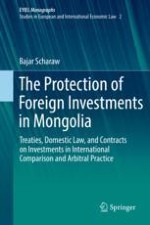This book analyses the adequacy of Mongolia’s legal system for foreign investment protection by conducting a multi-level assessment of international investment treaties, domestic legislation of the host State, and investor-State contracts from an international comparative perspective. The investigation distinguishes between three legal dimensions, each of which offers both substantive legal guarantees for the protection of investments in the host State and provisions for the settlement of investment disputes by arbitration. In the first dimension of Public International Law (PIL), Mongolia is bound by international investment treaties, which offer investors an international law setting. In the second dimension, a special domestic investment law defines the domestic framework for the establishment, promotion and protection of investments, but also for the conclusion of investor-State contracts. These contracts in turn open a third legal dimension, which represents a cross-section through the PIL and domestic-law dimensions of investment protection. Following the development of a multi-level system with legal dimensions that are not isolated but rather interrelated and mutually reinforcing, the book examines whether Mongolia’s international investment treaties and domestic investment law reflect globally shared international and domestic standards of treatment and protection of foreign investments. Lastly, the author inquires whether the domestic laws applicable to investor-State contracts in Mongolia allow investors and the Mongolian Government to agree on protective terms according to the (not uncontroversial) standards of international contract practice.
